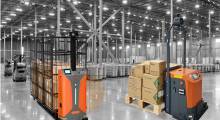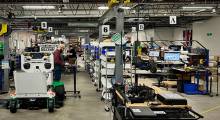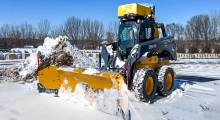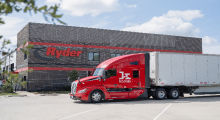As much of the U.S. suffers through a record-setting heat wave, autonomous vehicles can play a role in responding to such challenges. Plus this week announced that it is partnering with Good Machine on the venture studio's sustainability efforts. The Cupertino, Calif.-based company, formerly known as Plus.ai, said its self-driving trucks will move equipment to address wildfires, food insecurity, wildlife poaching, and illegal fishing.
“Sustainability is part of the core mission for both Plus and Good Machine,” stated said Shawn Kerrigan, co-founder and chief operating officer of Plus. “By joining forces, we are creating a win-win-win for our companies and the environment. Plus is delighted to serve as an enabler of Good Machine’s inspiring sustainability efforts by using our fuel-efficient autonomous trucks to transport the equipment and supplies needed to launch these projects.”
Serial entrepreneurs and industry veterans with experience in automotive technology and artificial intelligence founded Plus in 2016. The startup said that it has developed low-cost, high-performance, full-stack Level 4 autonomous driving technology. Its goal is to make long-haul trucking safer, more efficient, and more environmentally sustainable.
Plus plans to begin mass production and global deployment of its supervised autonomous driving system this year.
Good Machine aims to reduce emissions
Good Machine, which is supported by Schmidt Futures, said it is a venture studio that creates multiple companies annually to address social and ecological challenges. It and its portfolio companies work with partners including Johns Hopkins University, Minderoo Foundation, the National Science Foundation, the Nature Conservancy, the Wildlife Conservation Society, and WorldFish.
San Francisco-based Good Machine's projects include ReefGen, an underwater, dexterous, planting robot intended to revive marine ecosystems and coral tourism around the world.
Other projects include Fresure, a shipping container that uses solar panels to keep perishable foods cold during handling and storage to reduce post-harvest losses and relieve food insecurity. Good Machine's wildfire detection project aims to use stratospheric balloons for early detection of wildfires to help reduce catastrophic damage.
Plus and Good Machines said their partnership has begun with autonomous trucks hauling equipment from Winnemucca, Nev., to South San Francisco, Calif., to be used for a wildfire detection project in California. Additional trips will take place over the next year of the pilot program.
One benefit of using autonomous driving technology to haul goods on a semi truck is the reduction of fuel consumption by 10% to 20% in comparison with even the most efficient drivers, said Plus. This would result in an equal decrease in carbon emissions, it claimed.
“At Good Machine, we believe that solutions to the worldʼs most pressing problems need to be inventive, sustainable, and scalable,” said David Solomon, CEO of Good Machine. “We are excited to collaborate with a mission-aligned partner in Plus that is commercializing a sustainable commercial transportation solution which reduces the carbon footprint of our shipping needs.”
Plus adds partners
As part of the process of validating PlusDrive for mass production, Plus trucks recently completed a 4,000-mile journey along the Silk Road between Suzhou and Dunhuang, China.
Not only could the technology from Plus have a dramatic impact on the $4 trillion global truck freight market, but each truckload is also an opportunity to reduce the burden of trucking on the environment, said the company. Plus is collaborating with truck manufacturers, fleets, and ecosystem partners to develop decarbonization transportation solutions including autonomous trucks powered by natural gas.
Last month, the company announced that it will enter a merger with special-purpose acquisition company (SPAC) Hennessy Capital Investment Corp. V. Plus plans to trade on the New York Stock Exchange, and it expects to be valued at about $3.3 billion upon closure of the transaction, expected in the third quarter of 2021.
Article topics
Email Sign Up

















